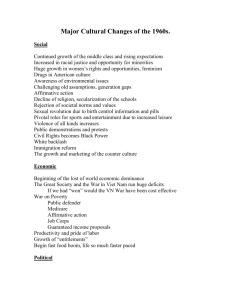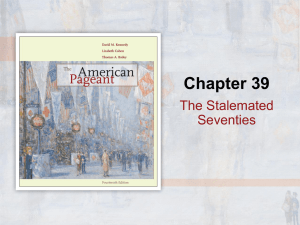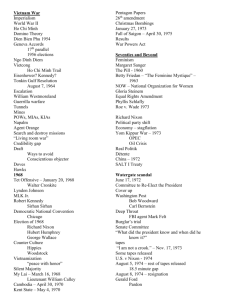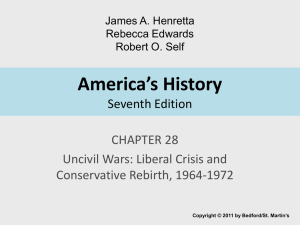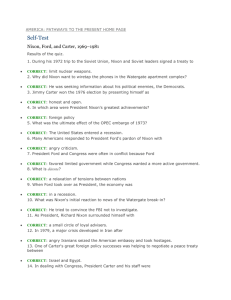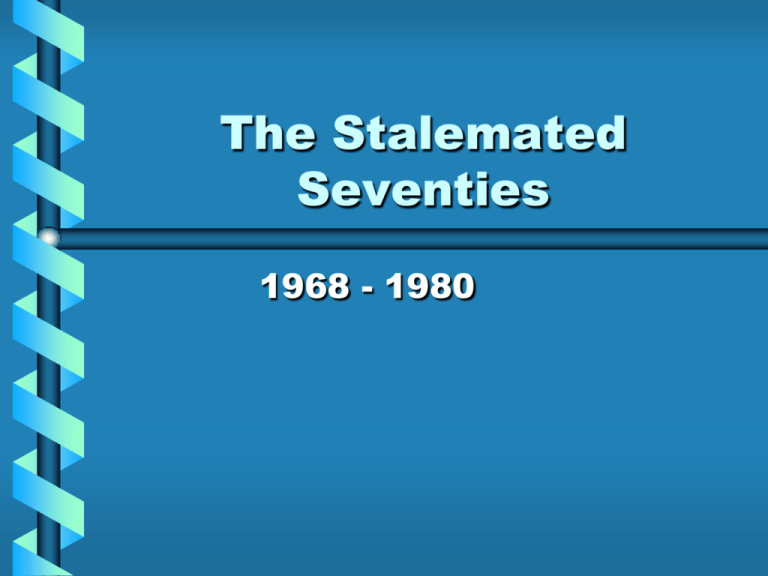
The Stalemated
Seventies
1968 - 1980
Economy Stagnates
• Slump in productivity
– increasing presence of women and
teenagers in the workforce
– Declining investment in new machinery
• Vietnam War drained tax dollars
• Oil prices rose & fed inflation
• Funding of Great Society programs &
no increase in taxes
• Too many dollars & too few goods
Nixon “Vietnamizes”
the War
• Nixon was inaugurated in 1969
– Brought valuable knowledge & expertise
in foreign affairs
• “Vietnamization”
– Withdraw 540,000 US troops in South
Vietnam over an extended period of time
– South Vietnamese- with US money,
training, weapons, & advice- could
gradually take over the fighting
Nixon Doctrine
– US would honor its existing defense
commitments
– However, in the future, Asians & others
would have to fight their own wars
without the support of large bodies of
American ground troops
• Nixon sought not to end the war but
to win it by other means
Nixon & Vietnam
• Nixon & VP Spiro Agnew attacked the
“misleading” media
– Appealed to the “silent majority” who presumably
supported the war
• Vietnam was grotesquely unpopular
– At home & even with soldiers
– Draft policies exempted college students & men
with skills
• Troops were mainly African Americans &
underprivileged youth
– Problems with drug abuse, mutiny, & sabotage
Anti-Vietnam
• Reports of soldiers “fragging” their
own officers
• Morale was low – lack of
replacements
• 1970 – Reports that in 1968 US
troops had massacred innocent
women & children in the village of
My Lai
Cambodia &
More Protest
• April 1970 – Nixon ordered an attack on
Cambodia
– Without consulting Congress
– Order was to clean out the enemy sanctuaries
• Kent State University, Ohio
– National Guard fired into a crowd killing 4 &
wounding many more
• Jackson State University, MS
– Highway Patrol was responsible for killing 2
black students
• June 1970 – Nixon ordered withdrawal of
troops in Cambodia
College students after Kent state, May 1970
College students after Kent state, May 1970
While many older Americans supported the actions of the Ohio National Guard,
students across the country boycotted classes and forced hundreds of campuses to
shut down. Some continued to protest during graduation at the University of
Massachusetts. ((c) Bettmann/Corbis)
Copyright © Houghton Mifflin Company. All rights reserved.
Congress Acts
• Senate ( not the House) repealed the
Tonkin Gulf Resolution
• Gov’t reduced draft calls & shortened
the period of draftability using a
lottery system
• 26th Amendment – 1971
– Gave 18 year olds the right to vote
Pentagon Papers
• Published by the New York Times
• Top secret study conducted about
American involvement in Vietnam
• Leaked by former Pentagon official
Daniel Ellsberg
– Uncovered the blunders & deceptions of
the Kennedy & Johnson administrations
• Especially the Tonkin Gulf attack in 1964
Nixon’s Détente
• USSR & China had rival interpretations
of Marxism
• President’s path was prepared by
security advisor Henry Kissinger
• Feb 1972 – Nixon visited China
– Paved the way for improved relationship
• May 1972 – Nixon visited the USSR
– Resulted in several significant agreements
Agreements between
the USSR & the US
• Great Grain Deal – 1972
– US would sell USSR at least $750 million
worth of wheat, corn, & other cereals
• Anti-Ballistic Missile Treaty (ABM)
– Limited each nation to 2 clusters of
defensive missiles
• SALT (Strategic Arms Limitation Talks)
– Freeze the number of long-range nuclear
missiles for 5 years
MIRVs
• Multiple Independently-targeted
Reentry Vehicles
– Overcome any attack by saturating it
with large numbers of warheads
– Against the ABM treaty
– Both the US & the USSR developed these
The Warren Court
Reflected deep concern for the individual
• Griswold v. Connecticut
(1965)
– Struck down a law
prohibiting the use of
contraceptives
• Gideon v. Wainwright
(1963)
• Escobedo (1964) &
Miranda (1966)
– Ensured the rights of the
accused to remain silent
& to enjoy other
protections when
accused
– All defendants are entitled
• New York Times v.
to legal counsel
• Engel v. Vitale (1962) &
School District of Abington
Township v. Schempp
(1963)
– Against required prayers
and Bible reading in public
schools
Sullivan
– Public figures could sue
for libel only if they
could prove malice
More Supreme Court
• Reynolds v. Sims
(1964)
– State legislatures
would have to be
apportioned
according to human
population
• Nixon appointed
Warren E. Burger to
replace retiring
Earl Warren
– Burger was
“believed” to be
more conservative
• Roe v. Wade
(1973)
– Legalized
abortion
Nixon’s Domestic
Policies
• Expanded welfare
programs
• Increased entitlements
like Food Stamps &
Medicaid
• AFDC – Aids to Families
with Dependent
Children
– Helped single parents
• Supplemental Security
Income (SSI)
– Benefits to elderly,
blind, & disabled
• Increased Social
Security
– Allowed for a cost of
living increase
• Helped reduce the
nation’s poverty rate
• Philadelphia Plan of
1969
– Hiring quotas
– Griggs v. Duke Power
Co. (’71) – prohibited
test & other devices
that would exclude
minorities & women
Nixon & the
Environment
• 1970 – Environmental Protection
Agency (EPA) & Occupational Health
& Safety Administration (OSHA)
• Rachel Carson – Silent Spring
– Exposed poisonous effects of pesticides
• Clean Air Act of 1970
• Endangered Species Act of 1973
Nixon’s Domestic
Policies
• Imposed a 90 day wage and price freeze in
1971 to stimulate the economy.
• He took the US off the gold standard and
devalued the dollar, effectively ending the
Bretton Woods system of international
currency stabilization
• Southern Strategy-appealed to white voters
by soft-pedaling civil rights and openly
opposing school busing to achieve racial
balance.
Nixon in 1972
• Nixon promised to end the war
– Spring 1972 – fighting escalated when
North Vietnamese burst through the
demilitarized zone between NV & SV
– Massive bombing attacks were launched
• George McGovern – Democrat
– Promised to pull US out of Vietnam
• Henry Kissinger announced that
“peace is at hand”
– Assured Nixon the election
Peace in Vietnam?
• Massive bombing of NV to force them
to the conference table
– NV agreed to a cease fire on Jan 23,
1973
– The US would withdraw its 27,000 troops
and reclaim 560 POWs.
– SV would be permitted to receive limited
US aid but no fighting forces.
– An election would be held to determine
the future of the country.
– Thinly disguised American retreat
Watergate
• June 17, 1972
– Attempted burglary of the Democratic
headquarters
– 5 men where arrested with bugging
equipment in their possession
• They were working for the Republican
Committee for Reelection of the President
(CREEP)
• White House aids and advisors were
forced to resign
– Criminal obstruction of justice (29 people)
Watergate Continues
• Improper or illegal use of the CIA,
FBI, and IRS
• Nixon’s aides had authorized a
burglary of Daniel Ellsberg’s
psychiatrist
• Televised hearings in 1973-1974
The Great Tape
Controversy
• Nixon denied knowledge of break ins
• Reports that Nixon had bugging
equipment installed in the White
House
– Nixon refused to turn over tapes
• Spiro Agnew – forced to resign in
1973 for taking bribes & kickbacks
• 25th Amendment
– successor to Vice President &
presidential disability
– Gerald Ford becomes VP
Saturday Night
Massacre
• Oct 20, 1973 – subpoena for tapes &
other documents from the White
House
– Nixon ordered the firing of Cox (special
prosecutor)
• Accepted the resignations of the attorney
general & deputy attorney general because
they refused to fire Cox
• 1974 – Nixon agreed to hand over the
“relevant” portions of the tapes
– Sections of the tapes were missing
Nixon Resigns
• Nixon refused to hand over the
missing part of the tapes
– Supreme Court ruled that he had to turn
over the tapes
– Nixon complied
• Impeachment hearings began
• Aug 5, 1974 – Nixon made public
three subpoenaed tapes
• Aug 8, 1974 – Nixon resigned on TV
Secret Bombing of
Cambodia
• Attacks continued on Cambodia
– Americans were told that neutrality was being
respected
• June 1973 – Nixon would end bombings 6
weeks later & would seek Congressional
approval in the future
• War Powers Act ’73
– Required president to report within 48 hours after
committing troops to a foreign conflict or
enlarging combat units in a foreign country
• Began period of “New Isolationism”
• Draft ended in Jan. 1973 and future
members were to be well-paid volunteers
Oil Embargo
• Oct 1973 – Syrians & Egyptians
attacked Israel
– Goal was to regain territory
• Nixon airlifted $2 billion in war
materials to Israel
• Arab nations began an oil embargo
on the US & other countries that
supported Israel
Energy Crisis
• Oil pipeline in Alaska received
congressional approval in ’74
• Speed limit lower to 55 miles per
hour
• Arab countries lifted embargo in
1974
– Quadrupled the price of crude oil
The First Unelected
President
• Gerald Ford
– 1st president to have never been elected
as Vice President or President
– Solely by a vote of Congress
– Granted a complete pardon to Nixon
– Sought to enhance détente
– Helsinki Accords, 1975: legitimized the
Soviet-dictated boundaries of eastern
Europe
Defeat in Vietnam
• Last American evacuated on April 29,
1975
– With them came 140,000 South
Vietnamese
• Estimated cost was $118 million and
56,000 dead
• US lost face in eyes of foreigners,
lost confidence in military, and lost
economic muscle
Feminist Victories
• Title IX (1972): forbade sex discrimination
in federally assisted educational programs
and activities
• Equal Rights Amendment (ERA) won
congressional approval
– 28 states ratified it—not enough
• Reed v. Reed (1971) and Frontiero v.
Richardson (1973) challenged sex
discrimination in employment
• Roe v. Wade (1973)struck down laws
prohibiting abortion
• Nixon vetoed nationwide public day care
Seventies in Black &
White
• Milliken v. Bradley (1974):
desegregation plans could not move
students across district lines
– Reinforced “white flight” to suburbs
• Affirmative action challenged with
cases of reverse discrimination
• Indians used civil rights tactics to
reassert their status as semisovereign peoples
– Seized village of Wounded Knee in 1972
– US v. Wheeler declared tribes subject to
will of Congress but not the states.
Bicentennial Campaign
• Democrat: Jimmy Carter
– Ran against the memory of Nixon
and Watergate
• Republican: Gerald Ford
• Carter received 51% popular
vote, 297 electoral votes
• Democratic majorities in both
houses of Congress
Carter inauguration day
Carter inauguration day
On inauguration day, President Jimmy Carter (b. 1924) and his wife Rosalyn caught
the public's fancy by walking from the Capitol to the White House. Despite this
symbolic beginning, Carter became increasingly isolated both from the American
people and from Congress. (Jimmy Carter Presidential Library)
Copyright © Houghton Mifflin Company. All rights reserved.
Carter’s Humanitarian
Diplomacy
• Camp David Accords, Sept. 1978
– Israel would return land seized in
1967 war, Egypt would honor
Israel’s borders
• Resumed diplomatic relations
with China in 1979
• Proposed to give Panama Canal
back to Panama by 2000
Camp David Accords
Camp David Accords
One of President Carter's greatest triumphs was the signing of the 1978 peace
accords between President Anwar Sadat of Egypt (left) and Prime Minister
Menachem Begin of Israel (right). The agreement followed days of personal
diplomacy by Carter at the Camp David presidential retreat. Both Sadat and Begin
received the Nobel Peace Prize for their efforts. (Jimmy Carter Presidential Library)
Copyright © Houghton Mifflin Company. All rights reserved.
Economic & Energy
Woes
• Inflation rising 10%/year
• Carter proposed energy
conservation and limiting
production of gas-guzzling cars
• Overthrow of Iranian shah led to
end of production of oil in Iran
– OPEC hiked up prices
Foreign Affairs
• SALT II agreements signed in June
1979
– Limited levels of strategic weapons
– Became dead letter in Senate
• November 4, 1979: US hostages
taken at embassy in Iran
– Rescue mission a failure; eventually
rescued by diplomatic agency
• USSR invades Afghanistan
– Slaps grain embargo on USSR and
boycotts Moscow Olympics



